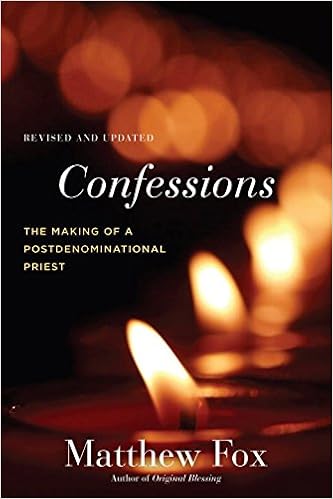I first heard of the radical theologian Matthew Fox when I was in college…at the time, he was the visionary founder of the Institute of Culture and  Creation Spirtuality in Chicago, shaking up the Catholic theological world with his teachings of joy, embodied-ness, ecology, activism and contemplation in prayer. I remember feeling intrigued, attracted to a Christian theology that honored creation as sacred…I didn’t know then that Dr. Fox’s work would eventually be the key to a new direction in my life.
Creation Spirtuality in Chicago, shaking up the Catholic theological world with his teachings of joy, embodied-ness, ecology, activism and contemplation in prayer. I remember feeling intrigued, attracted to a Christian theology that honored creation as sacred…I didn’t know then that Dr. Fox’s work would eventually be the key to a new direction in my life.
Mumble-mumble years later, as his student, I read Dr. Fox’s stirring autobiography, Confessions: The Making of a Post-Denominational Priest. It was published in 1996, three years after he had been removed from the Dominican Order as a heretic after 10 tumultuous years of standing courageously against the virtual freight-train of Vatican censure. So far from being crushed or finished by the ordeal, however, he was embarking at age 56, a free man, on radical new directions in his career.
Confessions describes Fox’s evolution from a Dominican seminarian, inspired by an exchange of letters with Thomas Merton to attend the Institut Catholique de Paris, where he first encountered the teachings of creation spirituality through his mentor, Pere M.D. de Chenu, and was challenged to incorporate activism for social justice in his contemplative spirituality.
He went on to spend 34 years as a successful and visionary educator, speaker, and author of 22 books, founding and directing the Institute in Culture and Creation Spirituality for a total of 19 years despite increasing criticism and opposition from -Cardinal Josef Ratzinger, then chief Inquisitor and head of the Congregation of Doctrine and Faith (later Pope Benedict XVI).
The cause of Ratzinger’s ire? Fox was a feminist theologian who called God “Mother;” he taught “original blessing” over original sin; he fraternized with Native Americans; he refused to condemn homosexuals, and other charges. When his work was reviewed and passed as theologically irreproachable, Ratzinger acted unilaterally, silencing Fox for one year in 1989 and forcing him to step down as director of the ICCS. Three years later he expelled Fox from the Dominican order, thus terminating the program at Holy Names College.
Confessions wrenchingly details those tumultuous years, closing with Fox’s new beginning in the Episcopalian Church, developing what would become the Cosmic Mass, contemplating the beginnings of a new University of Creation Spirituality, and asking deep questions on the future of the Catholic Church.
Just this week, North Atlantic Books published Fox’s revised and updated version of Confessions, picking up the story from where it left off and carrying it forward to the present day.
Five new chapters tell of Fox’s ongoing radical innovations in the worlds of education, worship, and theology: he founded and later retired from the University of Creation Spirituality; launched a revolutionary wisdom education program in Oakland’s public schools, retooled the Cosmic Mass, partnered in intellectual ventures with luminaries including Andrew Harvey, Bede Griffiths, Brian Swimme, David Korten, and Rupert Sheldrake; and published another 10 books.
Two of those books, A New Reformation and The Pope’s War, blew the whistle on Vatican scandals, presaging the ultimate retirement of his bête noir, Pope Benedict. Cautiously hopeful in seeing the renewal of social justice and liberation theology in Pope Francis’ reign, Fox nevertheless continues holding the Vatican to account.
Like the original Confessions, the revised and updated edition is simply and movingly told. I found rereading its chapter “What Will Belief and Holiness Mean in a Postmodern Era?” most moving: Fox is describing spirituality as an ecstatic, embodied experience that goes beyond the bloodless theory of religion. He writes of finding God by letting go of the predefined images of God, and looking instead “for a God of justice, of beauty, of celebration, of creativity, of truth, of wonder, of mystery, of nature, of humor, of earth and earthiness.”
Fox’s experiential description of the Divine embodied in creation is what called to me so many decades ago; it is in large part what has enabled me to reintegrate my adult spirituality; and as I see the experiential, earth-honoring spirituality of the rising generation, it is what gives me hope for the future.
As the new Confessions closes, Fox writes:
It has been a privilege to serve modestly in the task of bringing alive the creation spirituality movement all these years, trying to mine the treasures from that tradition and to do it not from an armchair but from the front- lines. While I bear certain wounds in my body and soul from the struggles, I anticipate with joy what is still yet to come.